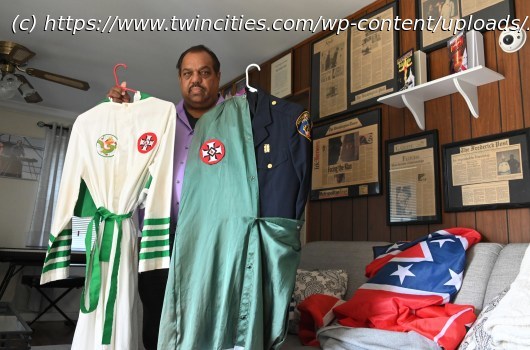« I don’t like to say that I convert anybody. I will say that I am the impetus for them to convert themselves. »
Daryl Davis, 67, started trying to talk white supremacists out of hating people like him when he was 10.
In his 2024 book, “The Klan Whisperer,” Davis, an R&B and blues pianist and guitarist, describes his encounters with Klan members and other racists during the past five decades. Over the years, more than 200 white supremacists have left their hate groups after meeting with him, according to Davis, who is Black and lives in Maryland.
As a young man, he played with a country and bluegrass band at the Silver Dollar Lounge in Frederick. Many of the patrons were “rough country types,” and “racial violence could erupt if Black men were present,” Davis wrote in his book. “Over time, I was accepted by the white patrons who didn’t perceive me as threatening. I became well-liked mostly because I was a musician.”
Eventually, Davis became friendly with a man named Hank, a Klansman who frequented the Silver Dollar. Every six weeks, Hank would show up with fellow Klansmen and Klanswomen to watch him perform.
“I would meet some of the Klan members on my break, while others did not want to meet me but would enjoy watching me and dancing to my music,” Davis wrote.
In an interview with The Baltimore Sun, Davis said the United States is at a crossroads regarding race relations. The conversation has been edited for length and clarity.
How did you start doing your anti-racism work, what you call your pro-human work?
I was born in Chicago; my parents were from Virginia, and my father worked in the U.S. State Department’s Foreign Service. So I grew up as a U.S. embassy kid, traveling around the world.
I attended a newly integrated school in Massachusetts in 1968. Several of my friends were in the Cub Scouts, and they invited me to join, and I did. We had a parade from Lexington to Concord to commemorate the ride of Paul Revere.
I was the only Black participant, and the streets were blocked off. The sidewalks were filled with white people walking, cheering, and having a good time. We reached a point in the parade route when suddenly I was getting pelted by rocks and bottles and soda pop cans, by a small group of spectators off to my right, on the sidewalk.






